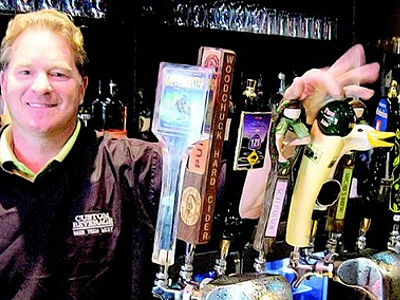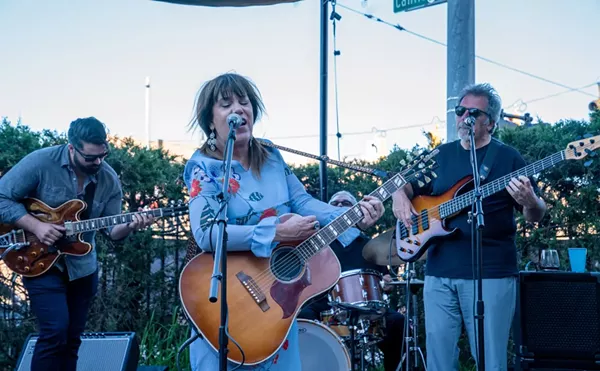These liquor distilleries are putting Detroit on the distilling map
A guide to Detroit's booze makers

Audio By Carbonatix
[
{
"name": "GPT - Leaderboard - Inline - Content",
"component": "35519556",
"insertPoint": "5th",
"startingPoint": "3",
"requiredCountToDisplay": "3",
"maxInsertions": 100,
"adList": [
{
"adPreset": "LeaderboardInline"
}
]
}
]
Detroit has a sordid past with liquor. In fact, it was the predecessor to Prohibition, the 18th Amendment outlawing alcoholic beverages in the United States, that was enforced by the Volstead Act. Michigan also passed the Damon Act in 1916. When that took effect in 1917, liquor was prohibited, thus leading to the surges in crime — bootlegging, rum running, moonshining — perpetrated by the Purple Gang and others.
The city was a hotbed of criminal activity until Prohibition was repealed in 1933. The area was completely devoid of any local distilleries for years, but now metro Detroit can take pride in a few local operations, Detroit City Distillery, Our/Detroit Vodka, Two James Spirits, and Valentine Distilling. Because of their grassroots operations and uncompromising work ethic, each of these establishments is discerningly Detroit. Simply put, the people behind these distilleries have very distinct visions of what they want to create.
Each one of these places has strong connections to the area. For example, Valentine’s Liberator Gin is named after the B-24 Liberator Heavy Bomber that was produced here in Detroit during the Second World War. The space in Eastern Market where Detroit City Distillery resides was once a slaughterhouse. The craft cocktail and micro-distilling craze is booming all over the country, and Detroit has thrown a rather large hat in the ring.
Valentine Distilling Company
161 Vester Ave., Ferndale; 248-629-9951; valetinedistilling.com
Valentine Distilling founder Rifino Valentine has an honest approach to his operation. “I have a simple philosophy,” he says. “Everything that I do must be done with quality in mind above all else.” Valentine is taking a stand against mass-produced liquors by utilizing hands-on, traditional techniques in its small production. Valentine’s tasting room in Ferndale offers hand-crafted cocktails and carefully prepared infusions featuring their original vodka, White Blossom Elderflower Vodka, the Liberator Gin, the Liberator Old Tom Barrel Aged Gin, and Woodward Limited Bourbon Whiskey.
If that’s not enough to get your attention, perhaps this will: In the short time Valentine has been operational, the distiller has won a dozen awards for their products, two gold medals for the vodka, one double gold for the vodka, one more gold in flavored vodka, four gold medals for its gin, two more for cask gin, with one four-star review and one silver medal for their whiskey.
The original vodka is medium- to full-bodied with a surprisingly fruity aroma not usually found in the neutral spirit. White Blossom Elderflower shares the same amount of body as the original, but is ripe with flavors of, umm, well, elderflower, but also lychee and spice. Valentine’s Liberator gins are both of very high quality, dry, and spicy. The Old Tom is unique in that it’s aged for two years in American Oak barrels. The aging process mellows the gin, and adds oak and vanilla notes. Cask gin is unlike any other liquor you’ve tasted.
Seeing as this is not Kentucky, bourbon is not a local commodity. However, what many distillers will do is purchase a bourbon mash from a producer in Bourbon County, Kentucky, then add their touch to it in the aging process. To create the Woodward Limited Bourbon, Valentine starts with a Bourbon mash of corn, barley, and rye. Then it’s aged for a minimum of four years in a blend of maple-infused American Oak barrels.
Detroit City Distillery
2462 Riopelle, Detroit; detroitcitydistillery.com
Detroit City Distilling embraces the city’s past the most of any of these local distilleries. From the work ethic employed by the company to the décor in the bar, every aspect has a retro feel to it. The eight childhood friends behind Detroit City understand how pivotal Detroit was in the prohibition era and pride themselves on making alcohol the old-fashioned way. The result is small batch production of their whiskies, vodka, and gin, which utilize local farms to supply the ingredients used in the recipes. Each of the labels that grace Detroit City Distillery’s bottles harks back to the Fitzgerald-esque decadence of the 1920s in Baz Luhrmann-style designs.
Currently, Detroit City Distilling is offering four different spirits, including the Bloodline Whiskey. The Bloodline is aged for one year with oak staves in reused cooperage. The recipe uses Michigan barley, winter wheat, and a blend of special malts to nail down a unique flavor. The label sports a Prohibition-era car that harks back to racing across the frozen Detroit River in order to bring thirsty Detroiters their sweet booze. The Two-faced Bourbon has a curious blend of aged bourbons. It consists of 49 percent bourbon aged for one to two years, and 51 percent straight bourbon aged for five years. It’s made in small batches with organic corn from Saint Clair County.
Vodka often gets a bad reputation because of its simplicity and lack of flavor. That’s why Detroit City has created recipe that squashes this notion. Their blend of Michigan grains and the classic technique of copper pot distillation not only produces a pure vodka, but one that’s worthy of more than just being covered up by fruit juice and soda. The other clear offering from Detroit City is the Railroad Gin, distilled with cardamom, juniper berries, citrus, and a blend of spices complement Michigan corn and barley.
In the tasting room, patrons can choose from a decent sized menu of both classic and original cocktails. Detroit City goes the extra mile to craft the accoutrement that makes the drinks so special, such as their house made drinking vinegars. Another trait they strive for in the bar is a lack of pretention. For example, while it’s usually closed on Sundays, they are open when the Lions are playing at home.
Our/Detroit
2545 Bagley Ave., Detroit; ourvodka.com/ourdetroit
Our/Vodka is an interesting project. In a partnership with Pernod Ricard to create a delicious vodka recipe, the first location was opened in Berlin with a second location in Detroit. It’s a “global vodka made by local partners in cities around the world.” This means that the recipe is the same for each city. However, the ingredients are locally sourced. This allows each distillery to give the vodka the character and personality of the city in which it’s produced. In all, there are the distilleries in cities across Europe and the United States. An art-house style short film on the project shows the Detroit People Mover, downtown, and of course, Michigan Central Station.
The medicinal looking bottle is small, measuring 375 milliliters, with a crown cap and a label specific to its city. The design is very minimalistic, yet elegant and eye-catching. “Keep it simple, it’s vodka,” is a motto of Our/Vodka, one that’s contrarian to Detroit City Distillery’s views on vodka. Each facility is outfitted with a micro distillery, which is designed and built by the company’s own engineer, Vincent Hoarau.
Our/Detroit is the labor of love for four women. Kate Bordine is the strategist and heads up design, Sara Aldridge is in charge of event planning and manages the bar, Jeane Marie Morrish is manager of the distillery, and Lynne Savino is director of sales. Together, their mission is “to invigorate Detroit through community engagement, outreach and celebration.”
The Detroit sect of the Our/Vodka project rehabbed an abandoned storefront on Bagley, near the Ambassador Bridge. The modern tasting room shares the same design mentality of the bottle, with a lot of white and minimalistic décor. For working solely with vodka, the tasting room has a fairly sizable cocktail list. In order to mix up the tastiest drinks that they possibly can while keeping in the spirit of representing the city’s personality, the ingredients are locally sourced. And because they’re seasonal, the menu changes quarterly to accommodate Michigan’s natural offerings
Two James Spirits
2445 Michigan Ave., Detroit; 313-964-4800; twojames.com
Corktown’s Two James Spirits was founded by good friends David Landrum and Peter Bailey, who set out to make small-batch spirits with local ingredients. Their products, such as the 28 Island Vodka, Old Cockney Gin, and Grass Widow Bourbon, became instantly popular upon release. Two of their newer spirits are the Rye Dog — a whiskey that is not aged, made from 100 percent Michigan rye — and the Grass Widow Madeira Barrique Reserve, their flagship bourbon aged in old Madeira barrels. This year, Two James won a load of awards in the San Francisco World Spirits Competition and the American Distilling Institute Eighth Annual Judging.
The circular bar sits in the Two James tasting room under bright lights. Detroit-themed artwork lines the wall. If you don’t know what you like, or you just want to try everything, drink flights are available. If you really like what you taste, bottles are available to purchase. Not only is it the very first distillery in the city of Detroit since Prohibition, Two James is a great place to celebrate family, friends, and community over well-crafted spirits and cocktails. The Metro is a delightful vodka cocktail with fresh lime juice and a hibiscus syrup. If you prefer gin, the Corktown Mule is an interesting spin on the popular Moscow Mule. Two James often rotates recipes on the menu, but it’s not hard to find something enjoyable.
Detroit has some of the best bars in the country, whether it’s a dingy dive or an upscale cocktail bar. Now the city is proving that it deserves to be recognized as an up-and-coming destination for micro distilleries. Making spirits is just another way the city is showing the rest of the world that it will not only survive, but thrive.





